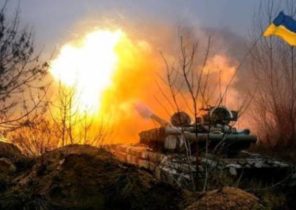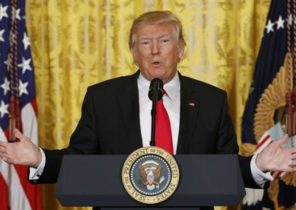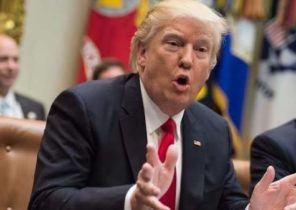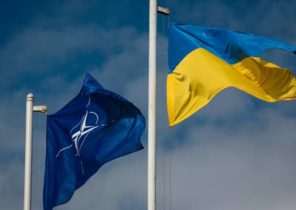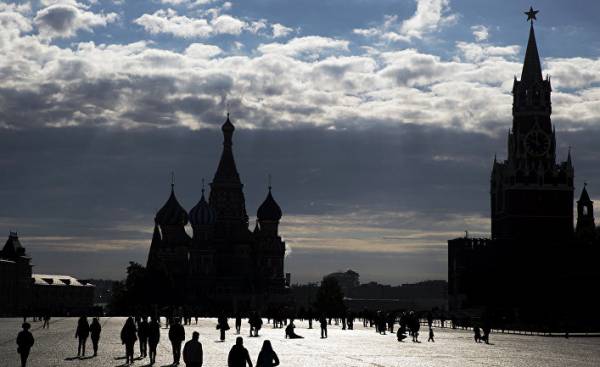
Not a chemical attack April 4 in Syria put an end to the virtual novel by Donald trump and Vladimir Putin. Point of contact denoting during the election campaign have disappeared, “when Democrats and Republicans of the establishment were convinced that relations with the Kremlin may lead to the collapse of the President,” says political scientist John Mearsheimer (John Mearsheimer), Recalling the inexhaustible supply of evidence, gathered around the non-transparent relations trump with Russia. First came the hackers, dirty trade relations, propaganda machine launched the production of fake news against Putin and trump. Next came the turn of the scouts and staff of trump. Michael Flynn (as Michael Flynn) a lot and not really speaking with Russian Ambassador Sergei Kislyak, a former campaign Manager of trump by Paul Manafort (Manafort Paul) advised the Pro-Russian leader Viktor Yanukovych, a businessman Carter page (Carter Page) — the trump then claims that he is not familiar with it, then offers his candidacy for any post in the presidential administration — was placed under surveillance in accordance with the resolution designed specifically for this trial. In July last year, the FBI began to investigate the reprehensible connection between the universe trump and the Kremlin. Exactly, FBI Director James Komi (James Comey) confirmed the fact, which resulted in a form of an asymmetric act of apology to Hillary Clinton (Hillary Clinton) that because of the investigation associated with the publication of her e-mails during the election campaign, accidentally discovered in Komi Republic, she may have lost the election. He acted like some referees disproportionately punished for a foul in an attempt to compensate for the mistake made before, against the other team. For some it was proof that even the head of the U.S. intelligence carries out the orders of the Kremlin.
The pressure of domestic politics became unbearable even for the undisputed master of red herrings and obfuscation of tracks through Twitter, and the environment, seeking evidence of the Russian conspiracy, Putin has turned from an asset to attract the nationalist layer, which led trump to the White house, in load that could lead to his death. Love story of authoritarian leaders were only sketch Comedy program Saturday Night Live. In reality, the trump with the President’s seriousness, said: “Perhaps we are experiencing the worst moment in relations with Russia.” The former full of mistrust, the relationship has recovered after an incredible period of fascination with each other. The American consciousness is thus returned to equilibrium after a doubt, which caused the President caring for the master of global anti-Americanism, the self-proclaimed violator of a liberal order with Atlantic power. These perverse games in love and hate with the Russian bear live in the atavistic cells of the American soul. There is a reason among a myriad of opportunities, pretexts and reasons presented by critics of the unpredictable President, during his rise to power (and all this material is of the highest quality), he decided to concentrate forces on the Russian question. No other conflict theme does not capture the same extent of the imagination of dissimilar resistance front Trump, because when it comes to Russian, it becomes legally, any accusation can be trusted, there are no crimes and violations, which cannot be attributed, directly or indirectly, a huge geopolitical enemy. China, which in the post-industrial jungle “forgotten man” is a predator, committing raids on workplaces and merge cheap industrial products to the West, is not called a source and an accomplice to any evil in the world. The superiority of the guilt belongs to Moscow. This simple task can be studied on the example file on trump prepared by the former British spy Christopher Steele (Christopher Steele), about the relations of the Kremlin with Republican candidate published in the press shortly before the inauguration of the President of the United States. In this case we are not talking about the independent report intelligence, and political study, commissioned by the opponents of the trump, and as such it reflects the interests of the customer. The picture is a giant conspiracy, in which a clever officials not only draw trump in a sinful Alliance, is actually recruiting him as a double agent of the secret services of the Kremlin, and turn him into a puppet in his hands, as the President becomes the victim of blackmail because of the skilful selection of evidence.
Some contacts described in this dossier, full of references to anonymous sources, was subsequently confirmed by independent parties, but in General it resembles paranoid and manipulative force, “exploiting personal obsession and sexual perversion trump”, to such an extent that it captured his alleged meetings with prostitutes, arranging the room of the Moscow hotel “Golden rain” in bed, where he slept Obama during his official visit to Russia. This is a set of hyperbole and built on some elements of truth, perfectly matched to the prejudices of those who read it. The value of this dossier from the point of view of the investigation appears to be almost zero, but it contained the testimony of America’s perception of Russia is valuable for the study of collective psychology. If you understand the American mentality, starting from the geopolitical Chronicles, we find Russophobic sentiments, and, apparently, they take us back to the antagonism (of course mutual) of the cold war era. A century of competition, economic models, and radically different life philosophy in the world, rallied around the two blocks, holding each other under a constant nuclear gunpoint, the constant competition in every field, from the space race to hockey and chess, usually establishes the way the existential enemy, but anti-Russian suspicions are not comparable to the anti-Soviet. The issue in more depth. But how? If anti-Russian sentiments characterize the historical pattern, what is the basis of this conflict, the hidden and hushed, full of threats and bellicose, ready to ignore the ceremonial precepts? Here begins the conflict of interpretations.
David Foglesong (David Foglesong), the historian of the relations of the United States and Russia from Rutgers University, explains to us that in the last 150 years of anti-Russian sentiment in America has undergone a significant intensity variation, but, in fact, always remained: “America has had moments of strong antagonism and even hatred of foreign States in certain circumstances, but these passions come and go, but in the American subconscious remains hostility to Russia, because it is tied to identity, and not only interests.” There was a period in the 19th century, explains the Professor, when “Russia was probably our best friend in Europe”, but the status has deteriorated because “America is a sense of mission about the transformation of Russia, it sees its mission in that it assimilated to its own nature.” In the book “the American Mission and the “evil Empire”: the crusade in the name of “Liberation of Russia” since 1881″ the scientist analyzed the attempts of generations of American politicians, intellectuals and activists to provoke changes in the Russian cultural device, starting first thing in the understanding of freedom, “exported” even beyond the Caucasus. The existential mission of the United States is synthesized in the category of “American exceptionalism”, which, in essence, implies, according to Foglesong, “moral superiority of America over all other countries. America doesn’t see itself as a normal state, but as agent of history, which is not subject to its laws.” It is no coincidence that “exclusivity” is a term which acts on the nerves in the Kremlin. When, in 2013, Putin wrote an article for the New York Times to speak directly to the American people in one of the most difficult moments of the Syrian crisis, he criticized the statements of Barack Obama about exclusivity: “I Consider it very dangerous to lay into people’s heads the idea of their exclusivity, whatever it was motivated. There are big countries and small countries, rich and poor, those with long democratic traditions and those still finding their way to democracy. And they spend, of course, different policies. We are different, but when we ask the Lord’s blessings, we must not forget that God created us equal.” Religious egalitarianism as a reflection on American democracy? An amazing paradox. Not to be outdone, the Minister of foreign Affairs of Russia to another difficult moment of the Syrian crisis (the one we are seeing now) shared with the journal the National Interest, his thoughts about the crimes of the Obama administration: “They were obsessed with our exceptionalism,” said he, daring to interpret the history of the Foundation of American democracy: the founding fathers of the United States is also talked about her leading role and was considered the American nation is exceptional, but they wanted others only took into account the American experience and followed the American example. They never proposed to impose, including the force their values on others”.
The irony of this ancient struggle with the exclusivity, the perception itself over history consists in the fact that the term was invented by none other than Stalin. It is usually attributed to Alexis de Tocqueville, however, this term never appears in the book “Democracy in America”, but it can be found in the evidence of conversation between the leader of the American Communist Jay Lawsona (Jay Lovestone) and Stalin in 1929. Lawson gave him the sad message that the American proletariat is not interested in the revolution. Stalin was in a rage told him to go back to America and put an end to the “heresy of American exceptionalism”. He was talking about heresy against the Marxist dogma, of course. The state with the most developed capitalism, that is the most ripe for revolution, did not meet the laws of the Communist revolution, so Stalin thought it “exceptional” in a bad sense, as a pathological case in the world, seeks to the rise of the proletariat. Resentment of Stalin was due to the fact that where the proletariat must triumph to win, he didn’t even realize. Dissatisfaction was due to the gap between expectations and reality.
According to Foglesong, latent Russophobia in the minds of Americans triggered the same way: “the Old idea of transformation of Russia in accordance with the American model in many cases seemed accessible and even inevitable, but when it never materialized, and Russia have maintained their identity, the euphoria turned into frustration and antagonism. This dynamic exists from the time of the Bolshevik revolution and the rhetoric of the evil Empire. From the point of view of identity conflict, the cold war took the place of a previous encounter. When the United States in 1905 played a role of mediator after the Russo-Japanese war, softened the humiliation of Moscow, they see the possibility of transformation of the Empire in the Western direction.” Otherwise, reformist organizations such as the Society of friends of Russian freedom (Society of Friends of Russian Freedom) for a long time with some success conducted its work, setting up public opinion in the English speaking world on the need to overthrow the tsarist regime and building a government of the liberal persuasion. “It is useless to say that the October revolution ruthlessly destroyed these illusions, erecting system, appeared even worse, than that which was proposed to reform the Americans,” explains Vogelsang.
The collapse of the Soviet Union is another important point, when America once again sees the half-open front of her calmly, using liberal tools to assimilate his main rival of the 20th century. Under the trumpeting signals the end of history the West sees as materialized the opportunity to attract Russia. Bill Keller (Bill Keller), the former chief editor of the newspaper the New York Times, which at sunset the cold war was a correspondent in Moscow and even received a Pulitzer prize, recalls in a conversation with our publication, “in the Gorbachev years, America has experienced a wave of euphoria in Russia. “Gorby” became in the United States more popular “rock star”, than in Russia. Since then, I’d say America’s relationship to Russia can be described as careless”. Complacency kills, as stated in a military motto, often appearing on the walls of American military bases, similarly the optimism of the era of perestroika proved to be a harbinger of a new depression. Ann Appelbaum (Anne Applebaum), a journalist of Polish origin, born in the United States and also, in turn, received the Pulitzer prize, I’m sure of Russophobia in America there, and dominated in its attitude towards Russia rather indifference: “Russia is not worried about American political circles to the invasion of the Ukraine. Evidence of Russian corruption were ignored, the military intervention in Georgia and political participation in Central Europe was minimized, and even after Ukraine the administration is careful. Only when Russia intervened in the American elections, revealing the strange relationship between trump and Putin, it really has sparked interest from the United States,” says our edition, Albaum.
One of the hypotheses explaining the sudden carelessness in regard to the fact that before this was considered the “evil Empire”, is the view that the collapse of the Soviet Union would automatically lead to a liberalization of Russia. “The Americans for many years exaggerated the distance that Russia has passed from his past to minimize our position. Over time it became harder to maintain that optimistic attitude,” explains Foglio Stephen Sestanovich (Stephen Sestanovich), a political scientist from Columbia University, engaged in relations with Russia in national security Council in the Reagan administration and state Department under the Clinton administration. “The turning point, of course, was the crisis in Ukraine. I spoke Russian, especially those engaged in foreign policy and security that the Pentagon no one made a career in dealing with the Russian threat. It offended some of my friends, who believed that Russia deserves greater attention, but it was true. At some point it ceased to be so. Today work in the field of deterrent threats on the part of Russia again is a great opportunity for a career. Who is responsible for these changes? Putin,” says Sestanovich.
If the virtual honeymoon trump and Putin, when evaluating it from a purely political point of view, was an anomaly in the system of convergence and downs, advances and failures, voltages, and restarts the relations between the two countries, it was embedded in the generated dynamics. We must not forget that the whole team of officials, enthusiasts and specialists in the Soviet Union of the same caliber as clintonesque strobe Talbott (Strobe Talbott), and were active in the 90-ies over the accelerating process of Americanization was inevitable, and a generation later, other colleagues such as Ambassador Michael McFaul (Michael McFaul), with the same zeal tried to fulfill the same mission on the background of Putin’s rule. The number of episodes marked the completion of the project, resuming Russophobia, which, it seemed, came to an end together with the history of Francis Fukuyama. The Munich security conference of 2007, where Putin accused America of destabilizing the global situation and in other sins, the war in Georgia, the case of Khodorkovsky, the invasion of Ukraine, interference in the war in Syria. Now we are seeing persistent support of the Assad regime and the Shiite axis, with which Moscow is projecting its influence in the middle East. In between there are meetings in Pratica di Mare and talk on camera about the reset with the red button, and nothing could reverse the direction of the relationship. But it is not only in the development phase after the cold war.
According to Foglesong, evidence that America’s actions before and after the Soviet period was aimed at deep reform of the Russian concept, not only to contain its strategic influence should be sought in the parallel destinies of two George Kenanov (George Kennan), distant relatives, celebrated two periods in relations between the US and Russia. More famous among them was the theorist of the containment of expansionism, inherent in the Soviet regime, but, as he explained in the “Long telegram” in 1946, the promotion and strengthening of the institutions of the liberal capitalist West was necessary to counter the threat. The clash of the two systems would inevitably lead to the assimilation of one party to the principles of the second. Less is known of Kenanov was a traveler, who at the turn of 19-20 centuries went on horseback to the most remote regions of Siberia, traveled around the Caucasus and down, drove Russia from Kamchatka to St. Petersburg. He was drawn the same mood, and his relative, and with the help of the society of friends of Russian freedom, he tried to promote public model similar to what he knew at home. He also became the founder of the first opposition against the tsarist regime Newspapers in English language “Free Russia”.
It is well-meaning, America’s commitment to free Russia, to save her from herself, created in the collective consciousness to a “presumption of guilt” Russian. This expression uses Nikolai Petrov (Nicolai Petro), Professor of political science at the University of Rhode island, who worked in the state Department under George H. W. Bush. No other state not accusing at the same time in so many abominations, says Peter, since instability in the middle East to win the trump, and this freedom is in charge of the Kremlin is the result of a process of “reducing the enemy to irrationality”. “Russian culture, explains Peter, is presented as alien. Many people, from Obama to Merkel, said Putin is an unpredictable leader, thinking in terms of the last century. The ruling class does not believe that the dominant geopolitics of the theory, operate in Russia. Or, at least, in this form it is presented to us. Hence the fact that America does not have to justify their policies in front of Moscow. However, if this background of relations between the two powers in a rational and transparent, and the other is vague and incomprehensible, it is easy to see what type relationship can be developed”. The only kind of relationship from the point of view of Petro, is determined by the “presumption of the superiority of universal liberal system, which with sincere intentions used for the treatment of the interlocutor”. If the American Russophobia exists, it generated euphoria in relation to Russia, a wonderful opportunity to return to Moscow on the right side of history, which cyclically appears. And similarly, cyclically disappears.
